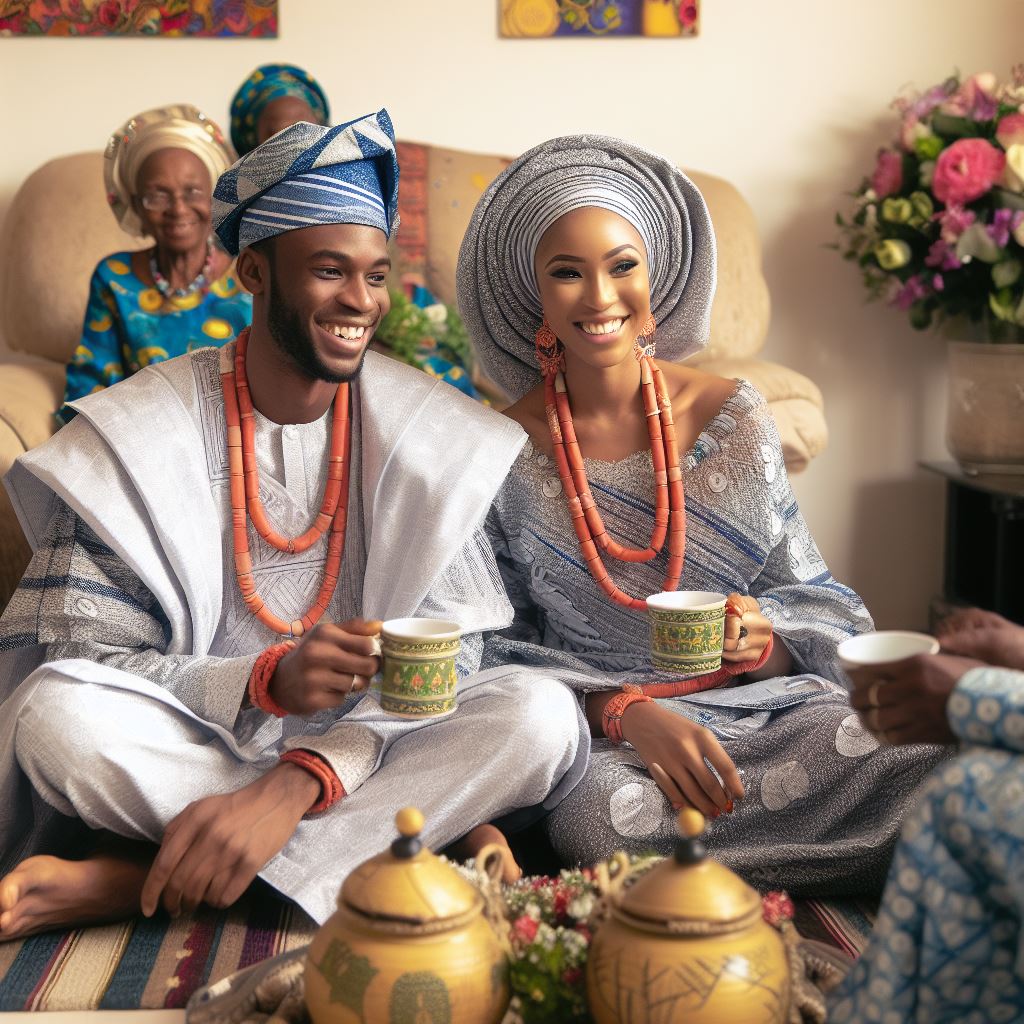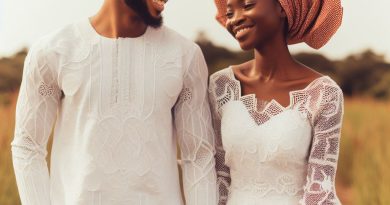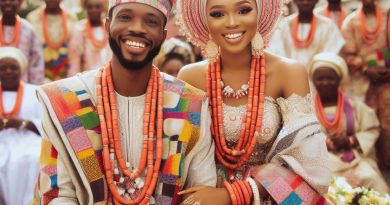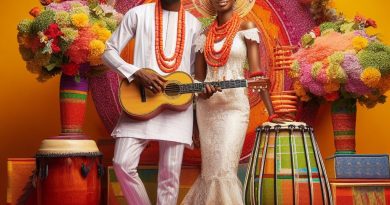Trends in Nigerian Weddings: From Tradition to Modernity
Last Updated on January 28, 2024
Introduction
Nigerian weddings are spectacular, multifaceted events that uniquely blend tradition and modernity.
These celebrations hold immense importance in Nigerian culture, representing not only the union of two individuals but also the merging of families, tribes, and communities.
Weddings are pivotal rites of passage, symbolizing love, commitment, and family. They serve as showcases of wealth and status, as well as opportunities to strengthen social bonds.
These vibrant events provide a lens into Nigeria’s rich cultural diversity, reflecting the nation’s various ethnic groups, each with its distinct customs and traditions.
From Yoruba to Igbo, Hausa to Ibibio, Nigerian weddings embody a tapestry of rituals, attires, music, and cuisines.
This blog section explores how fascinating trends have molded Nigerian weddings, influenced by globalization and blending traditional with modern elements.
It provides insight into the evolving nature of these beloved celebrations.
Traditional Nigerian Weddings
Overview of traditional wedding customs and rituals
- Traditional Nigerian weddings are deeply rooted in cultural customs and rituals.
- They serve as a way to celebrate the union of two families.
- Family members and friends play crucial roles in organizing and participating in these weddings.
- Customary rites, such as the introduction and the payment of bride price, are performed.
- The wedding ceremony itself involves traditional blessings, prayers, and the exchange of symbolic items.
- Traditional music, dance, and performances add to the festive atmosphere of the occasion.
- These weddings often follow a traditional timeline and specific procedures established by the community.
- Guests are treated to traditional dishes and drinks to honor the cultural heritage of the couple.
- Traditional Nigerian weddings are seen as a way to preserve and pass down cultural values.
- They are considered significant events that strengthen the bond between families and communities.
Cultural traditions and practices
- Cultural traditions and practices play a vital role in traditional Nigerian weddings.
- Each ethnic group in Nigeria has its own unique customs and traditions.
- These traditions reflect the values and beliefs of the community.
- Traditional wedding ceremonies showcase the rich cultural diversity of Nigeria.
- They provide an opportunity for families to display their cultural heritage with pride.
- The customs and practices followed during these weddings hold deep symbolic meaning.
- From the attire to the rituals, every aspect of the wedding is steeped in tradition.
- Traditional dances and songs are performed to celebrate the couple’s union.
- Customary greetings and gestures are exchanged to show respect and honor among guests.
- By prioritizing cultural traditions, Nigerian weddings serve as a source of cultural education and identity.
Examples of traditional Nigerian wedding attire
- Traditional Nigerian wedding attire varies across different ethnic groups.
- The Yoruba traditional wedding attire includes vibrant and colorful outfits.
- The bride may wear an “iro and buba” or a “aso oke” attire with intricate beadwork.
- The groom often wears a “buba” and “agbada” or a “fila” (cap) adorned with embroidery.
- In Igbo weddings, the bride wears a “george” wrapper and blouse, accessorized with coral beads.
- The groom wears a traditional “isiagu” outfit with a matching cap.
- Hausa brides often choose a “zainab” outfit, featuring a flowing gown and matching hijab.
- The groom wears a “baban riga” or “jalabiya,” along with a turban.
- Other ethnic groups like the Ibibio, Tiv, and Efik also have their unique wedding attire.
- Traditional Nigerian wedding attire showcases the beauty and richness of the country’s cultural heritage.
Traditional Nigerian weddings are a celebration of cultural customs and practices. They encompass various traditions and rituals that highlight the diversity of Nigerian culture.
From the elaborate wedding attire to the customs performed, each element holds significant symbolic meaning.
These weddings not only unite two families but also serve as an avenue to preserve and pass down cultural values.
By embracing traditional practices, Nigerians continue to honor their heritage and strengthen the bond among communities.
Read: Heartfelt Marriage Prayers and Their Bible Origins
Modern Nigerian Weddings
Influence of Western culture on Nigerian weddings
With the influence of Western culture on Nigerian weddings, traditional customs have intertwined with modern practices.
Couples now embrace elements like white wedding dresses, wedding bands, and walking down the aisle.
Additionally, pre-wedding photoshoots, bridal showers, and bachelor parties are now commonly integrated into Nigerian wedding celebrations.
Western customs such as cake cutting and the first dance have also been adopted, adding a touch of Western elegance.
Incorporation of modern elements and trends
Incorporating modern trends, Nigerian couples now utilize wedding websites and social media to share the details of their big day with guests.
Personalized wedding hashtags have become popular, creating a sense of unity and excitement among attendees.
To set the tone for their wedding, couples opt for creative and unconventional invitations, showcasing their unique personalities.
Shift towards lavish and extravagant celebrations
Modern Nigerian weddings also witness a shift towards lavish and extravagant celebrations. Opulence is now key, with grandeur and luxury taking center stage.
Venues are transformed into extravagant settings featuring elaborate stages, mesmerizing lighting, and breathtaking decorations.
Expensive wedding gowns, designer suits, and high-end fashion brands leave a lasting impression.
Guests expect nothing less than lavish dining experiences, exotic cuisines, and premium drink selections.
Entertainment includes celebrity performances, live bands, DJs, and even grand fireworks displays.
Rise of destination weddings and themed weddings
Moreover, there has been a rise in destination weddings and themed weddings in Nigeria.
Couples are now choosing to tie the knot in dreamy locations, adding an element of adventure and uniqueness.
Beach weddings, island resorts, and other exotic locations have become sought-after choices. Themed weddings allow couples to express their personalities and showcase their interests to their guests.
Fairy tales, vintage eras, cultural motifs, and even movie-inspired weddings are now embraced, complete with specialized decorations, costumes, and customized menus.
As Nigerian weddings continue to evolve, the blend of tradition and modernity creates a unique wedding experience.
Western culture, modern elements, extravagant celebrations, and destination or themed weddings all actively shape Nigeria’s dynamic wedding trends.
Read: Couples of the Bible: Stories and Marriage Verses
Popular Wedding Trends in Nigeria
Use of social media and technology
Brides and grooms increasingly leverage social media platforms to announce and document their weddings.
From Facebook to Instagram, couples share updates, photos, and videos to keep friends and family informed.
Wedding hashtags have also become popular, allowing guests to easily find wedding-related posts on social media.
Pre-wedding photoshoots and videos
Couples in Nigeria now opt for pre-wedding photoshoots and videos to capture their love story. These shoots often take place in picturesque locations, showcasing the couple’s chemistry and personality.
Pre-wedding photoshoots also serve as a way for couples to announce their upcoming nuptials.
Exquisite wedding decorations and venues
Nigerian weddings are known for their extravagant decorations and stunning venues.
Event decorators work tirelessly to create awe-inspiring themes, incorporating luxurious elements and vibrant colors.
Wedding venues range from lavish banquet halls to breathtaking outdoor locations, creating unforgettable experiences.
Wedding industry and the growth of wedding planners
The wedding industry in Nigeria has experienced significant growth, leading to the rise of professional wedding planners.
Wedding planners offer comprehensive services, including venue selection, vendor management, and budgeting.
They help couples navigate the complexities of wedding planning and ensure a seamless execution of their vision.
Live streaming and virtual weddings during the pandemic
The COVID-19 pandemic has prompted the adoption of live streaming and virtual weddings in Nigeria.
Couples have found innovative ways to include loved ones who are unable to attend physically.
Platforms like Zoom and Microsoft Teams have allowed couples to exchange vows in front of a virtual audience.
Despite the challenges, these virtual weddings have brought a sense of togetherness and celebration.
Nigerian weddings are evolving with the times, embracing modern trends while still celebrating tradition.
The use of social media and technology, pre-wedding photoshoots, exquisite decorations, and the growth of the wedding industry all contribute to the changing landscape of Nigerian weddings.
Even in the face of a pandemic, couples have found creative ways to adapt and include their loved ones.
Nigeria’s wedding scene continues to thrive, captivating the hearts of many with its unique blend of tradition and modernity.
Read: The ‘Married at First Sight’ Phenomenon: Nigeria’s Perspective

Discover More: Price Guide: Getting a Marriage Ring in Lagos Markets
Impact of Wedding Trends on Nigerian Culture
Reflection of societal changes and evolving values
- Nigerian wedding trends reflect the changing values and preferences of the society.
- People are now more inclined towards modern and Westernized wedding ceremonies.
- These trends showcase a shift towards individualism and a desire for uniqueness in weddings.
- Nigerian culture, known for its rich traditions, is adapting to these changes.
- Wedding trends are seen as a reflection of the evolving values within Nigerian society.
Potential eroding of traditional customs and culture
- The rise of modern wedding trends may lead to the erosion of traditional Nigerian customs.
- Some traditional wedding customs may be considered outdated and unsuitable for modern couples.
- Younger generations are more open to embracing new trends, prioritizing individual desires over traditions.
- With the growing popularity of modern weddings, traditional practices may fade away.
- There is a concern that the erosion of traditional customs could lead to the loss of cultural identity.
Debate between preserving traditions and embracing modernity
- Nigerian society is engaged in a continuous debate regarding the preservation of traditions.
- Many argue that preserving cultural customs is vital for maintaining a sense of identity.
- On the other hand, proponents of modern wedding trends believe in embracing change.
- They argue that incorporating modern elements can enhance the overall wedding experience.
- Balancing tradition and modernity is a challenge that Nigerian couples and families face.
- It is important to find a middle ground where traditions can be respected while embracing modern trends.
- Nigerian weddings should strive to maintain a connection with their roots while embracing the benefits of modernization.
- The debate between preserving traditions and embracing modernity is an ongoing dialogue within Nigerian culture.
Overall, the impact of wedding trends on Nigerian culture is significant. It reflects societal changes and evolving values, potentially eroding traditional customs.
However, the debate between preserving traditions and embracing modernity continues as Nigerian society seeks to find a balance.
Through this, Nigerian weddings can remain a celebration of heritage while incorporating elements of modern trends.
It is crucial to navigate this path carefully to ensure the preservation of cultural identity while embracing the transforming wedding landscape.
Read: Benefits of Seeking a Marriage Counselor Early in Conflict
Conclusion
Recap of the changing trends in Nigerian weddings
In recent years, Nigerian weddings have witnessed a significant shift from traditional customs to embracing modern elements.
Couples are now incorporating Western influences, such as white wedding gowns and destination weddings, alongside traditional rituals like paying dowries and performing cultural dances.
Importance of finding a balance between tradition and modernity
It is crucial for couples to strike a delicate balance between honoring their cultural heritage and embracing the modern world.
By incorporating both traditional and modern elements, they can create a wedding that reflects their unique identities while still respecting their roots.
Final thoughts on the future of Nigerian weddings
The future of Nigerian weddings is undoubtedly exciting and filled with endless possibilities.
As society continues to evolve, we can expect to see even more creative and diverse weddings that celebrate the rich traditions of Nigeria while embracing the globalized world we live in.


